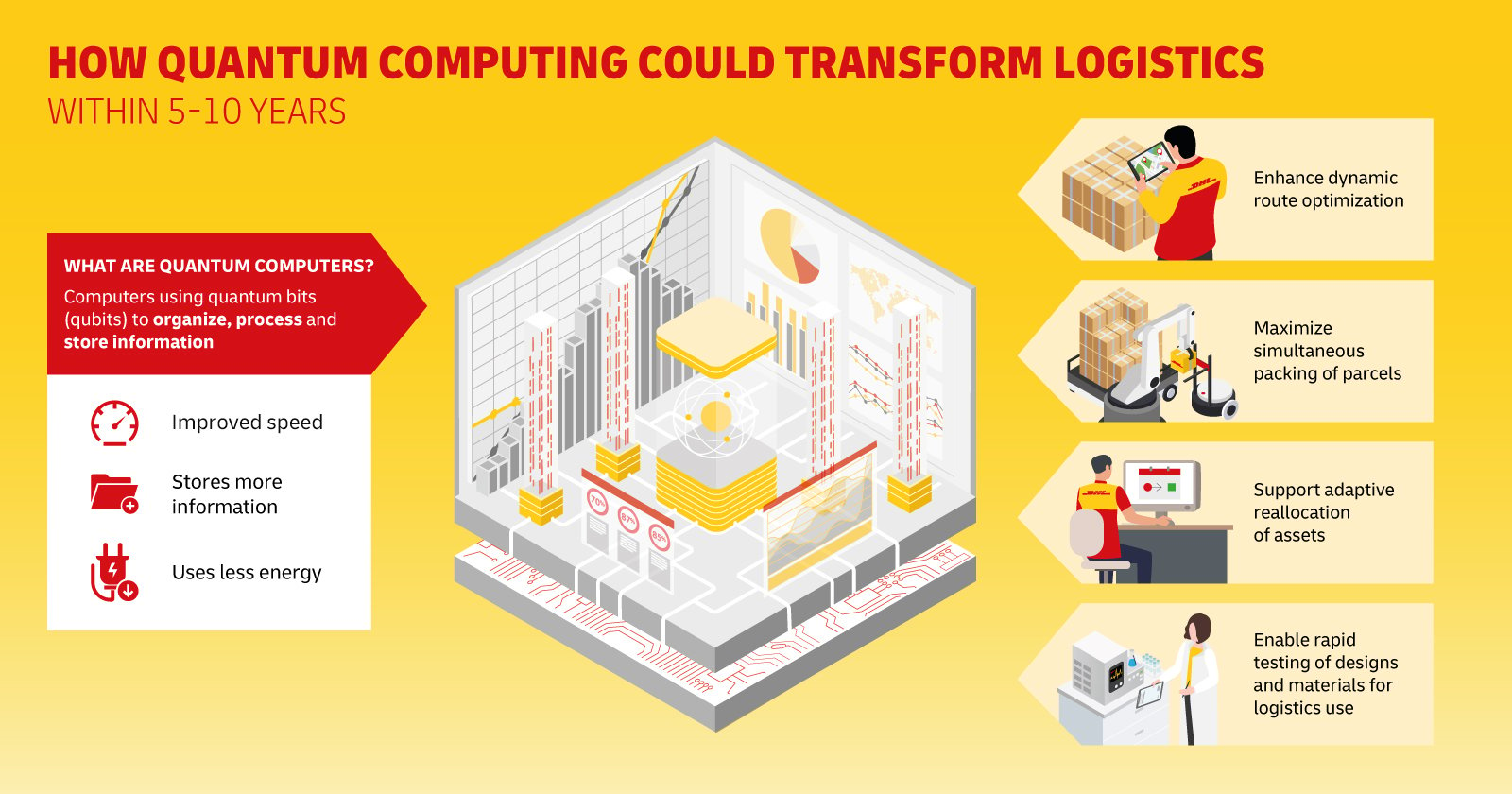
Quantum computing could transform the logistics industry within the next decade

Faster, safer, more powerful — the benefits of quantum computing can be best explained with these key traits. Though still largely unproven, the potential of quantum computing has already captured the imagination of industries from financial services to logistics.
To fully appreciate why quantum computers are recognized as the next technological breakthrough, one must first understand what quantum computing is.
Ordinary desktop computers and supercomputers organize, process, and store information called “bits” with binary values (ones or zeroes). Millions of these “bits” — in a combination of ones and zeroes —are what make up every app, website or photograph.
Quantum computers, on the other hand, use quantum bits, or “qubits,” to perform the same functions. A qubit is both a one and a zero at the same time with a probability between the two values.
To put this in context, a regular computer would calculate paths from the starting point one at a time until it finds the exit in a maze. In contrast, a quantum computer would calculate all paths simultaneously and report back once the right path is found.
This essentially means that a quantum computer is substantially faster and is capable of storing a larger amount of information while using lesser energy.
A new revolution in logistics
The exciting possibilities have sent technology giants into a frenzy as they ramp up investments to build commercial quantum computers capable of solving complex problems such as improving self-driving car technologies.
In the logistics industry, quantum computing is also earmarked as a key trend within the next five to 10 years, according to DHL’s latest Logistics Trend Radar which assesses the impact of new trends on the industry.

Tapping on the power of the technology, logistics providers can optimize supply chain processes with real-time dynamism that is not achievable by regular desktop computers or supercomputers.
Dynamic route optimization, for instance, continues to be an issue troubling the industry where consumer expectations of speed and cost-effectiveness reign supreme. With quantum computing making headway, however, this could soon improve.
The world’s first pilot project for traffic optimization — a partnership between automaker Volkswagen and public transport provider Carris — kicked off late last year in Lisbon, Portugal. Using a quantum computer, the fastest route for each of its nine participating buses over 26 stops was individually calculated in near real-time to help commuters avoid traffic congestion.
If fully developed, the system could be applied to any city and to vehicle fleets of any size, which could benefit last-mile deliveries for logistics providers.
In other aspects of the supply chain, quantum computing has also been identified as a key technology. Operational processes can be expedited by relying on the technology’s speed and accuracy, which will maximize the simultaneous packing capacity of parcels for freight transport worldwide.
Quantum computers will also help build a more resilient supply chain, as it supports adaptive re-planning and reallocation of assets in the event of unexpected shutdowns, late shipments or order cancellations.
Despite the potential of the technology, widespread usage is still years away, as questions remain over the highly touted capabilities of quantum computers.
While its properties are suited for creating “unhackable” communication within the supply chain, another quantum computer user with malicious intent could still overcome it.
After all, traditional encryption codes that take a supercomputer years to crack, now only require a matter of minutes with a quantum computer.
Work in progress
Last year, a survey by American technology company DigiCert revealed that 71 percent of global organizations viewed the emergence of quantum computers as a looming security threat, with most anticipating quantum computing threats by 2022.
Before quantum computers become a viable alternative to supercomputers, researchers need to first assess the cybersecurity implications of the technology. Through testing plausible solutions, such as lattice-based algorithms and more advanced cryptography, further development would be crucial to the safe rollout of the technology in the future.
“The technology is an exciting development for the logistics industry because it allows us to solve the recurring problem of finding the most efficient route between multiple nodes, which becomes increasingly difficult in a complex environment,” shared Justin Baird, Head of DHL’s Asia Pacific Innovation Center.
Why the 'Traveling Salesman Problem' illustrates the need for quantum computing
Why the 'Traveling Salesman Problem' illustrates the need for quantum computing
First formulated in 1930, the 'Traveling Salesman Problem' is an algorithmic problem used to calculate the most efficient path between a set of points. The more points there are, the higher the number of possible unique paths — often into the billions.
While trying all possibilities is an option, it is also the most time-consuming and expensive method. Quantum computers, with its faster speed than conventional computers, are hence best suited for picking the optimal route.
In logistics, the application of quantum computing would be a good fit since the last-mile delivery process requires an optimized route that allows for the delivery of a series of packages to different addresses in the shortest time possible.
Several technological breakthroughs are still required for quantum computers to become practical, safe and affordable for everyday use.
“The pursuit of rapid modeling and testing of complex designs and materials — through quantum computing — will help manufacturers produce superior ultra-efficient assets that could eventually be deployed in the logistics industry,” he explained.
Actual projects underway include the development of next-generation automotive lithium-sulfur batteries, and testing of exploratory airplane designs that maximize speed, efficiency, and sustainability.
In the long run, the efforts to develop quantum computing will ultimately result in use cases that potentially deliver a positive impact across different industries.
“The next five years will be a critical period that will help us determine the feasibility of quantum computing applications in the logistics industry as the technology matures and develops,” added Baird.
This article was adapted from DHL Trend Research’s latest Logistics Trend Radar.
ALSO WORTH READING











 English
English